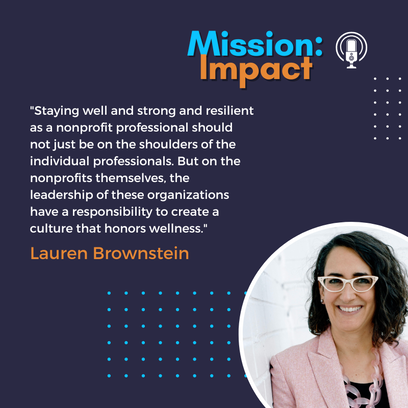Mission: Impact podcast & blog
Build a better world without becoming a martyr to your nonprofit cause
Listen on:
 In episode 72 of Mission: Impact, Carol and her guest, Lauren Brownstein discuss:
Guest Bio: Lauren Brownstein is the author of Be Well, Do Good: Self-Care and Renewal for Nonprofit Professionals and Other Do-Gooders. She has been working in philanthropy for more than 30 years as a fundraiser, educator, program manager, and administrator. She helps nonprofit organizations, philanthropists, and grant makers achieve their goals through PITCH, LLC, her fundraising and philanthropy consulting practice. As a reflection of her commitment to philanthropy and volunteerism, Lauren has served on the boards of several nonprofits and has volunteered extensively in the community. She was a certified foster parent before adopting a child from the foster care system. She earned a Masters in Teaching in Museum Education from the George Washington University and a Bachelors with High Distinction from the University of Virginia. She lives in the Washington, DC area. Important Links and Resources:
Click "Read More" for Transcript:  When I get caught up in an anxiety spiral, my thoughts quickly go worse case scenario. Something has happened, I get triggered and I run straight up the ladder of inference, jumping to all sorts of conclusions. Too often I am not even conscious that I have leapt from an incident – something someone did or did not do, something someone said, even a facial expression – to all sorts of beliefs about that, and most critically -- accepting those beliefs as fact. The ladder of inference created by Chris Argyris breaks down what our brains do so naturally and so quickly. We jump from the observable data to the data we pay attention. We then assign meaning to it, make assumptions, jump to conclusions based on our beliefs and then often take action based on this chain of thought. All this can happen in a split second. I have found that the ABC framework is a useful tool for slowing myself down and examining the validity of my thoughts and conclusions. Originating in cognitive psychology and the work of Aaron Beck, the acronym stands for Adversity, Belief and Consequences The tool is useful because it gives you a framework to break down what just happened. Here is an example of how you would use the tool: This first step captures what just happened. The next step is to examine those thoughts and beliefs. Then one step further takes each of the worse case scenario beliefs, examines their likelihood and helps you play out alternative scenarios as well as make sounder decisions about next steps. Adversity: A colleague yawns during my presentation. The next time you find yourself caught in an unhelpful thought loop try this out for yourself. Learn more in the book The Resilience Factor by Karen Reivich, PhD and Andrew Shatte, PhD.
|
Categories
All
Archives
July 2024

Grace Social Sector Consulting, LLC, owns the copyright in and to all content in and transcripts of the Mission: Impact podcast, as well as the Mission: Impact blog with all rights reserved, including right of publicity.
|
Telephone301-857-9335
|
info[at]gracesocialsector.com
|
Grace Social Sector Consulting, LLC, owns the copyright in and to all content in, including transcripts and audio of the Mission: Impact podcast and all content on this website, with all rights reserved, including right of publicity.
|